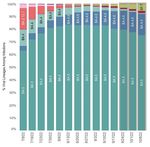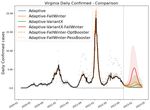KEY TAKEAWAYS October 7, 2022
←
→
Page content transcription
If your browser does not render page correctly, please read the page content below
UVA COVID-19 MODEL
WEEKLY UPDATE
October 7, 2022
KEY TAKEAWAYS
Case rates continue to decline. Thirty-one of Virginia's thirty-five health districts are
in declining trajectories, with only one (Mount Rogers) in a slow growth trajectory. 246,086
The transmission rate (Rₑ) is below 1.0 in all regions, and only above 0.9 in the Total Bivalent Booster
Northern region. Doses Administered
Only five localities in the Commonwealth are still reporting "High" community
levels. Masking in indoor public places is still recommended for everyone in these
13.4 per 100k
Average Daily Cases
communities. A further 25 localities are reporting "Medium" community levels. Week Ending October 3, 2022
High-risk individuals in these communities should continue masking as well.
Variant proportions continue to evolve as expected. BA.4.6 and BF7 are making 0.865
slow progress against BA.5 which remains dominant. There is no significant growth Statewide Reproduction
by any novel variant in the Commonwealth. Number as of October 3, 2022
Models suggest the possibility of a winter surge. If the Commonwealth follows the
same trajectory it did in 2020 and 2021, transmission rates will begin increasing in
5
the next few weeks. It is critical that Virginians get boosted this fall. Models suggest Virginia Localities at
High CDC Community Levels
that a bivalent booster campaign could prevent 150,000 cases by March. as of October 6, 2022
KEY FIGURES
Variant Mix – HHS Region 3 CDC Community Levels
As of October 6, 2022
Click Map for Full Size Image
Growth Trajectories: No Health Districts in Surge
Click Map for Full Size Image
VDH.VIRGINIA.GOV/CORONAVIRUSUVA COVID-19 MODEL
WEEKLY UPDATE
THE MODEL COVID-19 is a novel virus,
The UVA COVID-19 Model and weekly results are provided by the UVA
Biocomplexity Institute, which has over 20 years of experience crafting and and the variant mix
analyzing infectious disease models. It is a health district-level Susceptible,
changes periodically.
Exposed, Infected, Recovered (SEIR) model designed to evaluate policy
options and provide projections of future cases based on the current course These models improve
of the pandemic. The Institute is also able to model alternative scenarios to
estimate the impact of changing health behaviors and state policy.
as we learn more.
THE SCENARIOS
Unchanged: The model uses scenarios to explore the potential paths the pandemic may take under future conditions. Model
projections take a variety of factors into account, including current variants, vaccine uptake, vaccination/boosting rates,
previous infection, waning immunity, weather, and behavioral responses. The "Adaptive" scenario represents the current
course of the pandemic, projecting it forward with no major changes. The "VariantX" modifier explores the potential impact
of a new variant emerging in the next few months. This hypothetical variant is imagined as having the same immune escape
and transmissibility advantages over BA.4/5 that BA.4/5 did over the earlier BA.2. See page three of the July 15 report for
details. The "FallWinter" modifier layers seasonal increases associated with colder weather, holiday gatherings, and travel,
on top of the base scenarios. It does this by artificially adjusting transmissibility between September and January to match
transmissibility from the same time last year. The new "OptBooster" (optimistic) and "PessBooster" (pessimistic) modifiers
assume that a bivalent vaccine booster campaign will begin in September. The optimistic scenario assumes that 90% of
those getting a Flu vaccine will also get a bivalent COVID19 booster. The pessimistic scenario assumes that 45% will.
MODEL RESULTS
Updated: As always, the current course
"Adaptive" scenario is shown in blue. This
scenario projects a continued decline of
cases. In this scenario, Virginia will fall
below 500 daily cases by late-October.
Both the "Adaptive-FallWinter" (orange)
and "Adaptive-VariantX" (shown in green)
scenarios project mild surges. The former
peaks at 1,500 daily cases in late January,
the latter at 1,000 daily cases in February.
The "Adaptive-VariantX-FallWinter" (red)
combines both a hypothetical new variant
with the seasonal forcing of Fall / Winter.
The combination allows for a significant
surge, peaking at almost 5,300 daily cases in
mid-January before quickly declining.
The "Adaptive-FallWinter-OptBooster" Click on Graph for Full Size Image
and "Adaptive-FallWinter-PessBooster"
Date of Latest Model Run: October 5, 2022
scenarios (dashed orange lines) show that a
Date of Next Model Run: October 19, 2022
booster campaign can severely curtail a
Fall/Winter surge. The optimistic booster Please note: The data and projections shown here reflect reported cases. During the
Omicron wave, testing shortages resulted in far fewer infections being reported as
scenario cuts total cases by over 65%. The cases. This suggests fewer total infections than experienced in January. Please see
pessimistic scenario cuts them by 45%. page three of the May 13th modeling report for more details.
(Explore the model results in detail on this dashboard)
VDH.VIRGINIA.GOV/CORONAVIRUSUVA COVID-19 MODEL
WEEKLY UPDATE
CONVERGENT EVOLUTION
When you hear the word "predator" any number of animals
may come to mind. But whether wolf, lion, or bear, hawk,
alligator, or even the mighty Tyrannosaurus rex, a number
of common characteristics stand out. Sharp claws or talons
for grabbing prey. Sharp teeth or beaks for tearing and
chewing meat. The ability to move and strike quickly. Most
predators have both eyes on the front of their heads, linked
to specialized areas of the brain that can do trigonometry
on the fly. This allows them to quickly and accurately
measure the distance to their prey. This tendency to evolve
similar solutions to similar problems across a diverse array
You do not need to be a paleontologist to know this theropod was a
of species is known as convergent evolution. predator. Large sharp teeth and claws make that very clear.
Source: "Suchomimus tenerensis theropod dinosaur (Elrhaz Formation,
Lower Cretaceous; Gadoufaoua, Tenere Desert, central Niger, northwest-
central Africa) 1" by James St. John is licensed under CC BY 2.0.
These same evolutionary pressures are affecting COVID-19. Early
in the pandemic COVID-19 faced little resistance. It evolved
slowly, and new variants varied widely. Today, however, most
people have some immunity from prior infection or vaccination.
New variants have to find a way around this protection, and
regardless of the strain they emerge from, are displaying various
levels of convergence around five unique mutations to the spike
protein. Several variants now circulating have three or more of
these mutations, but only one, BQ.1.1, has all five.
Successful new variants are converging on similar spike protein mutations
.
Source: twitter.com/dfocosi/status/1574319177602670592?s=12&t=myre59DuQ1H31TI_-yd7DQ
Not all predators rely on the same, convergent solutions, however. Spiders build webs, snakes use venom, and human have
large brains that allow them to create tools, along with opposable thumbs to manipulate them. One new variant, XBB, seems to
have developed its own unique solutions. XBB is a recombinant variant, meaning it is composed of two separate strains of
COVID-19. Although still early, both BQ.1.1 and XBB appear to show substantial immune escape and, importantly, appear to be
less affected by therapeutics such as Paxlovid. XBB, in particular, appears to be particularly good at evading immunity. One pre-
print paper (under review) noted that XBB's immune escape might be as high as that of SARS-CoV-1, an entirely different virus.
Vaccination is Our Best Protection
Both BQ.1.1 and XBB are very new and it remains to be seen what impact they
may have. However, COVID-19 continues to evolve, and some experts suggest
new variants may already be driving COVID-19 surges in both Europe and Asia. Current
Progress
Importantly, the protection against severe disease and death afforded by
previous infection and vaccines has held up even COVID-19 has evolved.
Vaccination and booster shots stimulate your immune system, ensuring this
protection remains robust, decreasing the chance of infection and severe
disease. The new bivalent vaccines train your immune system to counter two
strains of the virus, which may increase its ability to neutralize new variants.
In just a few short weeks, almost 250,000 Virginians have chosen to get the new
bivalent vaccine, often in conjunction with a flu shot. Getting vaccinated and So far, Virginia's bivalent booster uptake is matching the
"Optimistic" scenario. A strong bivalent booster uptake
boosted when eligible is the best way to protect your family and your could significantly reduce the total number of COVID-19
community in the upcoming holiday season. cases, hospitalizations and deaths this holiday season,
regardless of strain. (Click on image for full size.)
VDH.VIRGINIA.GOV/CORONAVIRUSYou can also read


























































